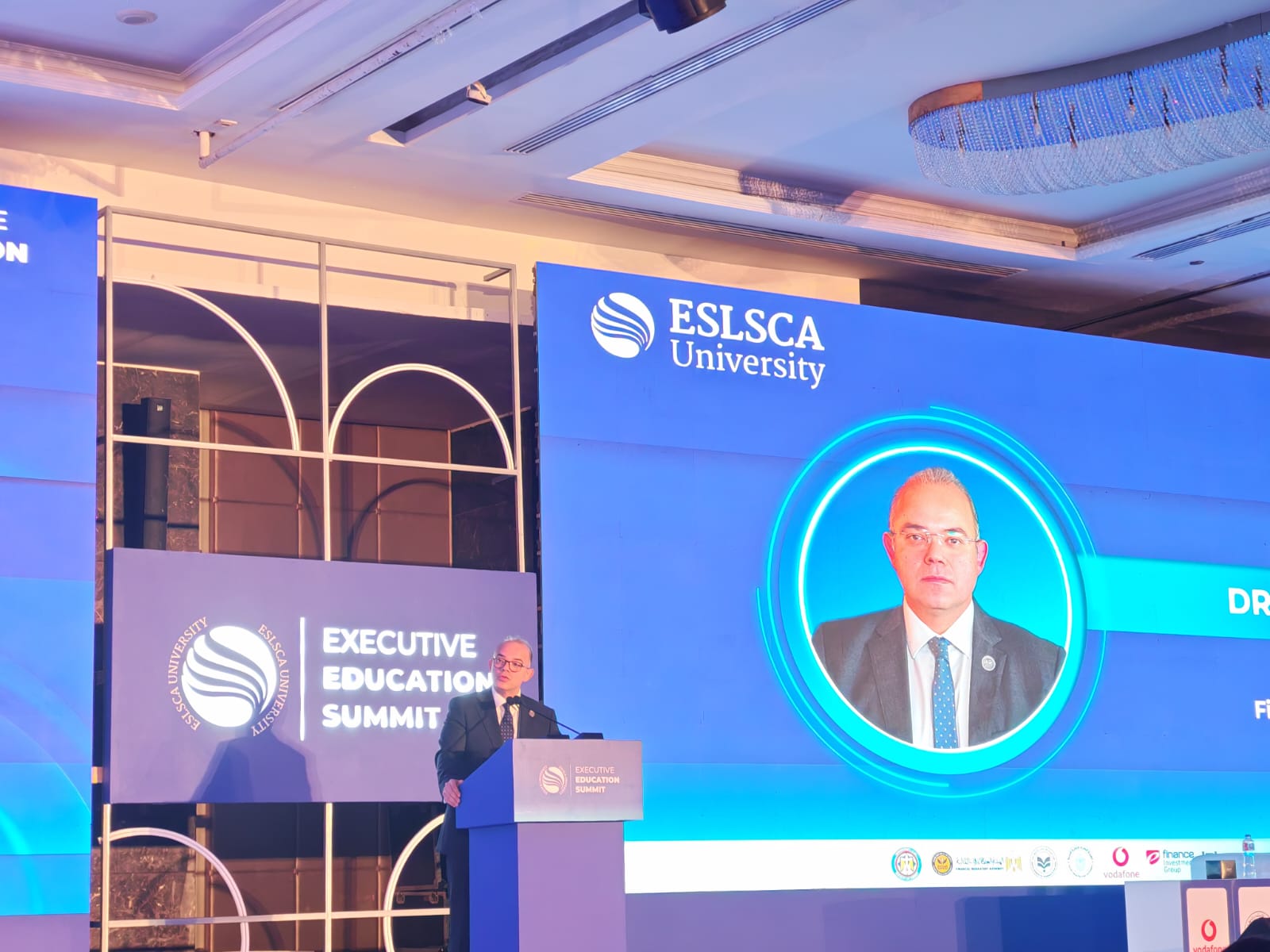Dr. Mohamed Farid – FRA Chairman:
- Continuous professional education is the engine that translates policy into measurable results, ensuring business sustainability and competitiveness.
- Institutions are required to change the old work environment to accommodate the ideas of the new generations (Gen Z and Gen Alpha).
- Education must adapt to reforms to avoid becoming disconnected from reality.
- Tangible results in women’s empowerment paved the way for the upcoming launch of a dedicated smartphone application for women.
In an address that established the features of Egypt’s business future and set a roadmap for enhancing competitiveness and sustainability, Dr. Mohamed Farid, FRA Chairman delivered keynote speech at ESLSCA Executive Education Summit 2025.
On behalf of FRA and the Egyptian Ministry of Finance, Dr. Farid asserted that successful economic reform and development in Egypt hinges on robust investment in human capital.
He stressed that Continuous Professional Education (CPE) is the cornerstone for transforming ambitious policies into tangible, practical results, and is essential for guaranteeing institutional flexibility, competitiveness and the ability to achieve long-term sustainability amidst evolving challenges.
Dr. Farid clarified that the requirements of the current phase necessitate aligning executive education with the ongoing reforms in the Egyptian economy. He warned that any educational system that fails to keep pace with these transformations will inevitably produce “education disconnected from reality.”
According to FRA Chairman, the recent period witnessed the implementation of crucial regulatory resolutions, such as the first-ever governance standards for insurance companies and key professions regulation. The latter sets precise requirements for core positions, including mandatory Continuous Professional Education (CPE) hours for all employees.
FRA Chairman further noted that FRA resolution regarding the registration of accountants and auditors mandates both an annual minimum and a three-year accumulation of specialized training, thereby ensuring their readiness to efficiently comply with supervisory requirements.
Dr. Farid called upon universities and executive education centers, including ESLSCA, to continuously monitor regulatory developments and update their curricula to meet market needs, stressing that investment in the human element is the essential tool for guaranteeing policy execution and achieving institutional goals.
Addressing women’s representation, FRA Chairman explained that boosting female presence on company boards is a key pillar of comprehensive governance development, noting that tangible results have already been achieved across the market.
He highlighted that the percentage of companies with female board members has risen significantly from 14% in 2020 to 27% today. Concurrently, the total number of female board members has increased from 400 to 1,140 women. This major leap is the direct result of targeted regulatory interventions and systematic leadership training and qualification programs implemented by the Authority in recent years.
Dr. Farid emphasized that the Authority approved several resolutions in this regard, including resolution No. 123 of 2019 and No. 124 of 2019, which ensure gender diversity within the leadership structures of listed companies and non-banking financial institutions.
Furthermore, FRA resolution No. 204 of 2020 explicitly prohibits gender-based discrimination in financial services, while resolution No. 205 of 2020 offers financial incentives to companies that actively work to promote gender inclusion.
This series of resolutions also includes Prime Minister’s Decree No. 2479 of 2018 (amended by ministerial decree No. 3456 of 2022), which modifies certain provisions of the Executive Regulations of the Capital Market Law, notably including provisions governing the issuance of gender bonds.
Dr. Farid noted that FRA is developing the “Women’s Empowerment” smartphone application to serve as a tool connecting qualified women with board opportunities within the non-banking financial services sector. He also mentioned the launch of specialized training programs aimed at equipping ambitious female leaders with the essential governance and leadership skills required for board membership.
Dr. Farid addressed the challenges of aligning Gen Z and Gen Alpha with traditional work models, pointing out that these generations have distinct expectations regarding the work environment, motivation and sense of belonging.
Additionally, FRA Chairman asserted that leadership must reframe interaction tools and loyalty building within institutions. This must move away from outdated concepts where young employees tolerate harsh working conditions (in terms of hours or compensation) in exchange for long-term experience investment. He stressed the importance of developing innovative solutions to attract and retain young talent.
He emphasized that developing flexible and innovative work environments within financial institutions is a strategic necessity. This ensures attracting young talent and investing their energies in a way that boosts institutional competitiveness and sustainability.
In closing, Dr. Mohamed Farid affirmed that Continuous Education, Women’s Empowerment, and Investment in Human Resources are genuine executive components, not mere slogans. These factors are what enable institutions to transform visions and policies into practical actions and measurable results, ultimately enhancing their resilience and their capacity for future competition.
Last modified: November 25, 2025
